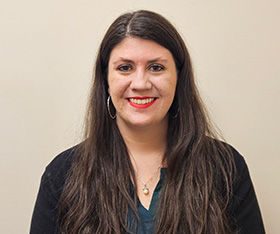Veronica Sublett Breeden, M.S.

Veronica Sublett Breeden
Lecturer of Chemistry
Georgia Gwinnett College, Lawrenceville, Georgia
B.S., Chemistry, Tennessee Technological University
M.S., Chemistry, Tennessee Technological University
Veronica Sublett Breeden got her first teaching assignment as a middle schooler in Knoxville, Tennessee. Another student had transferred from out of state and needed help catching up with the school’s science curriculum. Sublett Breeden spent hours walking her classmate through the material and loved every minute of it.
From then on, Sublett Breeden knew she wanted to teach. She set her sights on chemistry specifically after taking college-level chemistry courses as a high school student at Tennessee Technological University’s Governor’s School. There, Sublett Breeden says, she discovered that chemistry enabled her to apply mathematics to something that was real, that she could actually touch.
She then earned bachelor’s and master’s degrees in chemistry, while gaining experience as a teaching assistant along the way.
Today, Sublett Breeden is a lecturer of chemistry at Georgia Gwinnett College in Lawrenceville. The most important part of her job, she says, is teaching students how to study well and how to become part of the college community.
When students tell me that I’m helping them and building their confidence, it makes me feel like I’ve chosen the right career.
What did you research as a master’s student?
I focused on green organic chemistry. My main research project involved developing more sustainable methods to synthesize phenytoin, an antiepileptic drug. Instead of using benzaldehyde, I used almond extract. And instead of using an electrical source to warm the reaction, I used a reflective solar dish that reflected sunlight for heat.
After earning your master’s, you began teaching chemistry part-time at Motlow State Community College in Smyrna, Tennessee. What drew you to that position?
I wasn’t ready to go into a 6-year PhD program because I had already been in school for so long. And while I thought that I wanted to go into chemistry education, I wasn’t totally sure yet whether I would enjoy it as a career, or whether I’d be good at it. I took this first position as a sort of test, to see if this is what I was really meant to do. It ended up being a rough start to my teaching career because the schedule was so difficult. I had an hour-long commute, and I was teaching classes starting at 8 a.m. 5 days per week.
What made you decide to stick with teaching?
After only one semester, I moved to Georgia because my husband got a new job. I continued teaching at Motlow State online and also picked up part-time positions at a few additional schools in Georgia. One of those positions turned into my current full-time role as a lecturer at Georgia Gwinnett College. Working part-time jobs at multiple schools was exhausting and not sustainable financially. But it helped me realize that I really did enjoy teaching. I also gained confidence in my teaching skills. My students said things like, “Wow, I finally understand this,” or they would thank me for being so available and patient with them. When students tell me that I’m helping them and building their confidence, it makes me feel like I’ve chosen the right career.
What is a typical week for you like?
I teach three courses each semester, which adds up to about 9 hours of lecturing and 9 hours of teaching labs each week. And I spend from 3–12 hours grading, depending on the week. If I’m teaching a new course, I also spend 3–4 hours each week getting my lectures ready as well as additional course materials, including quizzes and exams.
As a lecturer, I am also required to serve on committees. Depending on the semester, the number and type of committees vary. Currently, I serve on a chemistry department committee focused on inviting different speakers to come present their research to our students and a school committee focused on organizing educational and interactive events for middle school students. In a typical week, I will spend 1–4 hours organizing and communicating with the other committee members and outside personnel.
I also do a lot of volunteering with our students and the community. I’m the co-advisor for our student ACS chapter, and we’re always busy planning monthly outreach activities both for our campus and for our local community. For February, for example, we did a demonstration on campus where we froze roses with liquid nitrogen and then smashed them. We also plan social events. Each year, for example, we host an online trivia night and invite other ACS student chapters.
Are there any challenging aspects of your job?
Time management is always difficult. I have to be intentional about blocking out time for specific tasks, like grading or catching up on emails.
The other challenge is figuring out how to meet the needs of students who come to our school with hugely different levels of preparation. Many are first-generation college students, first-generation Americans, or both. Some students are unprepared for the math skills required for a general chemistry course. So I have to teach them math while also encouraging them to stick with chemistry. At the same time, I have highly prepared students who fly through the course. Supporting students with these differing needs is a huge balancing act. But I love working with all of them to teach not only chemistry but the learning and study skills they’ll use to succeed in any career.
This profile has been edited for length and clarity. The opinions expressed in this interview are the author's own and do not necessarily reflect the view of their employer or the American Chemical Society.

